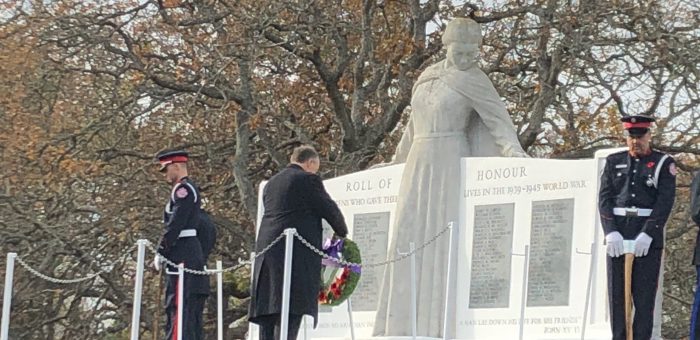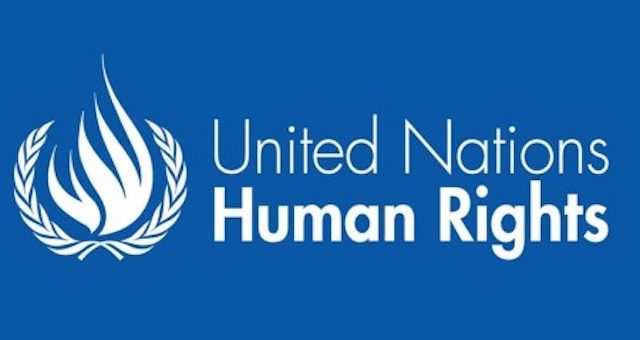Issues & Community Blog - Andrew Weaver: A Climate for Hope - Page 40
Statement on Remembrance Day
Today I had the distinct honour of laying a wreath at the Oak Bay Cenotaph in commemoration of remembrance day. This year our remembrance is particularly poignant as we mark the 100th anniversary of the Armistice of 1918 and the end of World War One.
Below I reproduce a public statement my office issued on Remembrance Day.
Statement
Andrew Weaver statement on Remembrance Day
For immediate release
November 9th, 2018
VICTORIA, B.C. – Andrew Weaver, leader of the B.C. Greens, issued the following statement in recognition of Remembrance Day this Sunday:
“On Remembrance Day we take time to honour the sacrifice of those who have served our country. This year our remembrance is particularly poignant as we mark the 100th anniversary of the Armistice of 1918 and the end of World War One.
“We live in an era of deep division and strife, as demonstrated by the racist and anti-Semitic hate crimes we witnessed two weeks ago. We must remain vigilant in denouncing all forms of discrimination and recommit to fostering diversity and peace. These are the values that our veterans, armed forces, merchant marines, and their families, have fought for and continue to fight for. To allow hate to grow in our society is to forsake their sacrifice.
“At 11am on Sunday morning, I encourage you to hold two minutes of silence. Take this time to reflect upon the deep historical and current significance of the day, and to recommit to the values that Canadians hold dear.
“Lest we forget.”
-30-
Media contact
Jillian Oliver, Press Secretary
+1 778-650-0597 | jillian.oliver@leg.bc.ca
Bill 50: Human Rights Code Amendment Act, 2018
Today on the legislature we debated Bill 50: Human Rights Code Amendment Act, 2018 at second reading. This bill re-establishes the British Columbia Human Rights Commission after it was disbanded by the BC Liberals in 2002. BC is in the only province in the country without a human rights commission.
Before 2002 BC had a Human Rights Commissioner which worked as the gatekeeper to the tribunal and did investigations directly. Instead of going back to that model, this Bill creates a ‘direct access’ model, which works well in other jurisdictions like Ontario. The Tribunal will continue to be responsible for all aspects of human rights applications (processing, mediation and adjudication), while the commission will look at broader patterns of systemic human rights issues, policy development and public education
This bill closely follows the 25 recommendations in the report compiled by Parliamentary Secretary for Sport and Multiculturalism Ravi Kahlon on establishing a new BC human rights commission. The report outlines recommendations in five categories, including the commission’s creation, purpose, functions, powers and early priorities.
Below I reproduce the text and video of my second reading speech.
Text of Speech
A. Weaver: I rise to take my place in this second reading debate on Bill 50, Human Rights Code Amendment Act. As I’ve mentioned, this bill re-establishes the British Columbia Human Rights Commission after it was disbanded by the B.C. Liberals in 2002. It does this by amending the human rights code to establish an independent Human Rights Commission office.
As I mentioned, this is another example of pendulum swings that have plagued our first-past-the-post system here in the province of British Columbia. When governments come in, we see broad policy sweeps — very costly at times — as, for example, the labour code and others where policies comes in and are taken back as governments switch with the different ideologies.
I’m looking forward to these kind of changes — more draconian pendulum swings no longer really taking place here in British Columbia — with a successful referendum on proportional representation. One of the things we know is that policies like this…. You don’t establish something, then tear it down and then re-establish it and tear it down.
That tends to get mitigated, and we wouldn’t have to be debating this today were we to have a government that was required to listen to broader elements of our society than, perhaps, was required in 2002, when there were but two NDP MLAs sitting in opposition and every other MLA was a member of the B.C. Liberal Party, despite just getting slightly over 50 percent of the vote.
The new office is going to be similar to other independent offices, like, for example, the Representative for Children and Youth. Obviously, I’m delighted that this is being introduced into this House. Both the B.C. NDP and the B.C. Greens campaigned on bringing back a human rights commission to actually look at human rights issues proactively instead of just reactively, as is done now.
This bill is finally bringing B.C. in line with other jurisdictions in the country. We are the only province that has not had a human rights commission these past 16 years. It’s yet another noteworthy aspect of British Columbia that we are not so proud of, not having a human rights commission for the last 16 years.
The new bill and the new provisions in the bill that will be enacted will not take us back to the pre-2002 model but will instead set up a similar model to what exists presently in Ontario. In that respect, it’s less of a pendulum swing than we might have otherwise have expected.
The bill follows the 25 recommendations that were outlined in the report brought forward by the Parliamentary Secretary for Sport and Multiculturalism. This report was based on eight weeks of public consultation on this subject. Of course, as well the UN Paris principles had been used as a guide for drafting of this bill.
This bill is needed for a number of reasons. It’s needed to fight systemic injustices across our province, to protect against patterns of discrimination proactively and to be able to champion education campaigns on human rights and inequality across the province, particularly in areas where there are systemic issues.
It’s important to allow the commissioner the power to create guidelines in education programs for other institutions in our province to use as well. This bill is, therefore, putting back the Human Rights Tribunal into the rightful place as the arbitrator of specific complaints regarding human right contraventions.
There’s many things in British Columbia affecting British Columbians that that need an office like this with a mandate like this to look into. The number one issue referred to the current Human Rights Tribunal is disability non-accommodation. I would anticipate that this this is an area that the new commissioner will work on proactively, as well, to explore systemic issues of disability and non-accommodation.
To give a bit of history in this, we’ve gone back and forth in B.C., as I mentioned, on having a human rights commissioner and commission. We had one, for example, that the Socred government eliminated in 1983. Then we didn’t have one, and then the B.C. NDP government of the 1990s brought it back in. And the B.C. Liberals, in 2002, brought it out, and now it’s coming back in again — a beautiful example of the pendulum swing that has mired B.C. politics for such a long time, where we’ve had dynasties of single-party domination, which, after many years, forget to actually remind itself that it is there to represent the people and not its vested interests or its donors.
Hopefully, this is the last time the pendulum will swing and that it will settle in the middle, along the lines of what every other province in our country has — a human rights commission that not only reacts to human rights issues that are brought to it but is proactive in terms of dealing with systemic issues of human rights contravention in our province.
We like to think that there are none, but we all know cases where there are. In 2002 — giving some more history here — the human rights commission was eliminated for political reasons, I would argue. It was forced to cut its budget, cut its staff, and to add insult to injury, the commissioner and the acting chief commissioner were fired in the morning before legislation to get rid of the commission was introduced.
Fired in the morning before the legislation was introduced to eliminate the commission. Somewhat spiteful, if you ask me, and not a type of signal, really, that we should be sending the province of British Columbia. It was widely condemned, this decision, by the human rights groups across the province.
One of the only MLAs that raised the voices of the human rights groups that were affronted by the B.C. Liberals removing this commission was Jenny Kwan, one of but two NDP MLAs serving in the B.C. Legislature in 2002.
She said that by abolishing the commission, B.C. will fail to meet the criteria of the Paris principles, which require that human rights agencies have “independence guaranteed by statute or constitution, autonomy from government, diverse membership, a broad mandate based on universal human rights standards, adequate powers of investigation and sufficient resources.”
Government shutdown the previous human rights commission to save $3.1 million, but at what cost? At what cost to broader society did this saving of $3.1 million lead? Perhaps the government knew that further cuts were coming when it did it. It was consistent with the government of the day, in essence, disadvantaging those who were already disadvantaged. Not raising rates — disability rates, welfare rates, housing assistance rates — for a decade. It was consistent with a kind of mean-spirited approach to government that prevailed at that time.
B.C. has not had a body that could look at systemic patterns of discrimination and recommended changes for almost two decades. That, of course, is all changing now with this legislation. The systemic discrimination facing Indigenous communities, women, people of colour, LGBTQ+ individuals, people with disabilities. It’s real, severe and completely unacceptable. The uphill battle faced by British Columbians who are at the intersection of more than one of these communities is even steeper.
Government had a hand in creating these discriminatory systems, so we need to dismantle them and rebuild a more fair and just province. This is what Bill 50, Human Rights Code Amendment Act, takes us on a journey and pathway towards creating.
I and my colleagues in the B.C. Green caucus are very supportive of this legislation and are delighted with the changes proposed — long overdue, long called for. I thank government for introducing them, and we’re proud to stand in support at second reading.
Video of Speech
Introducing amendments to the speculation and vacancy tax
In the legislature today the Minister of Finance introduced a motion to send a number of amendments to committee stage for Bill 45 – 2018: Budget Measures Implementation (Speculation and Vacancy Tax) Act. These amendments match the three amendments that I put on the order papers although they were drafted by independent legislative drafters. The reason why government needed to do this was to ensure that my amendments were not ruled out of order by the Clerk. Amendments can be ruled out of order if they incur a cost on government.
Below I reproduce (in text and video) my brief remarks in response to the Minister’s motion. I was inappropriately cut off by the Speaker. The motion was a debatable motion and I should have been given 30 minutes to address it. The speaker was reacting to Mike Farnworth, the BC NDP House Leader, who stood up and was gesticulating to me and the speaker that the the motion wasn’t debatable. He was wrong. But you can’t challenge a speaker’s ruling.
Text of Speech
A. Weaver: Just a few words briefly on this motion. I’m pleased, obviously, to rise and take my place in the debate on this. The motion to move the amendments to the speculation and vacancy tax act.
For procedural reasons, government had to table these amendments. You’ll see some amendments I put in on the order paper as well. But the amendments that government is tabling reflect the agreement that we were able to reach with government on this tax a few weeks ago. I’m pleased to be supporting moving them to committee today. These amendments do three things — the three things as promised. Again, on the order paper, you will see three amendments that I put in that are virtually identical. But for procedural reasons, government is introducing these amendments.
The first is that mayors from affected municipalities will be consulted annually by the Minister of Finance on how the tax is affecting their communities, with metrics that are being developed. Over the past number of months, I’ve consistently raised the need for local governments to have a more significant role in determining what happens in their communities. The annual review of the tax with mayors will give communities a clear channel to making the case, based on evidence, for how the tax should apply to their communities and whether they should be excluded.
The minister will also be required to report the results of the annual review to cabinet to make a decision on whether the tax should continue to be applied in each of the specified areas. While I would have preferred for local governments to have the ability to opt out automatically, this is a compromise position that I feel I can support and my colleagues can support as well.
The second amendment requires that revenue raised by the tax will be used for housing initiatives within the region it came from. This is also important — that local communities directly benefit from the tax raised so that it is not viewed as a tax grab by government that rolls the moneys into provincial coffers to be lost thereafter. There needs to be a clear impact on the communities because the justification for the speculation tax is, of course, that there’s an externality, a social cost, that we’re asking people in British Columbia and elsewhere to internalize through the application of the speculation and vacancy tax.
The third amendment equalizes rates for Canadians and British Columbians. It brings the rate for Canadians down from 1 percent to 0.5 percent. Now, this is a very big change. Back in the spring, when this tax first came out, it was 2 percent for other Canadians.
Here after many, many months of working with government to come to razor-focus this tax to exactly this intent and purposes, it’s very reassuring to see that the rate has come down to 0.5 percent.
I believe fundamentally that from a fairness perspective, we should not be penalizing Canadians by making them pay higher rates just because they happen to live in another province. We are one country. I feel that as one country, we need to treat our citizens equally across that country.
In addition to these amendments, government has made a number of small changes in the legislation that go a long way to limiting the unfair impacts of this tax on Canadian homeowners who aren’t speculators.
Since it was first introduced in the budget, I’ve been hearing scores of cases that I’ve been bringing to government over the past eight months from people who are not speculators and who should not be facing the tax, as well as other examples where the speculation tax shouldn’t apply.
Deputy Speaker: Thank you, Member.
A. Weaver: My understanding, hon. Speaker, is on a motion, I am able to deliver a full 30 minutes.
Deputy Speaker: Member, this is purely a procedural motion. This allows the amendments to be placed before the House for debate. Not at this time.
A. Weaver: Is this not a debatable motion, hon. Speaker?
Deputy Speaker: Not at this time. This is a motion to refer.
Motion approved.
Video of Speech
It’s time to stop spraying glyphosate on BC Forests
Today in the legislature I rose during Question Period to ask the Minister of Forests, Lands, Natural Resource Operations and Rural Development what his ministry was doing to curtail glyphosate spraying in BC forests. Glyphosate is the active ingredient in Monsanto’s Roundup™. It’s used to kill off broadleaf plant species that might inhibit the growth of seedlings that are replanted after a forest is logged. There are a number of significant negative impacts that arise from the current practice of widespread glyphosate spraying.
Below I reproduce the video and text of our exchange.
Video of Exchange
Question
A. Weaver: Every year in B.C., 16,000 hectares of forests are sprayed with an herbicide known as glyphosate. It’s sprayed over forests that have recently been logged and replanted to kill broadleaf plant species that might inhibit the growth of lodgepole pine seedlings. The result is reduced plant diversity, leading to monocropped forests that are vulnerable to more frequent and destructive wildfires and beetle infestations.
The World Health Organization has warned that glyphosate is likely carcinogenic. It also has genotoxic, cytotoxic and endocrine-disrupting properties. For decades, researchers have been reporting reduced numbers of rodents, moose, insects and birds in forests that have been sprayed.
To the Minister of Forest, Lands and Natural Resource Operations, if our forests exist for the monetary value once felled, glyphosate is an efficient tool. If we consider the value of our wildlife ecosystems and human health, it is a veritable threat. What are the values that inform our ongoing use of glyphosate in B.C. forests?
Supplementary Question
Hon. D. Donaldson: Thank you very much to the Leader of the Third Party for the question on glyphosate. It’s a topic that I’ve been following closely since 1990. It’s of great interest to people around B.C.
Glyphosate is broadleaf herbicide. Many members in the House might recognize it as the active ingredient in Roundup. I want to say that our government is committed to protecting the important biodiversity of forests while ensuring a continued vibrant forestry sector.
The herbicide glyphosate is approved by Health Canada for use in forest management and is used to improve survival and growth of trees. In B.C., any users must follow the Integrated Pest Management Act and take steps to minimize impacts on the environment, including fish-bearing streams, a very important consideration.
B.C.’s reforestation practices are continually updated based on new scientific research and information, and recently, the ministry started to allow increased levels of aspen and broadleaves in managed stands throughout B.C., which will lead to a further decline in the use of herbicides.
I know the member quoted a figure of 16,000 hectares where glyphosate was applied. That was a number from 2015. I’m happy to report, in 2017, that number went down to 10,000 hectares — so a decrease of almost 40 percent.
Supplementary Question
A. Weaver: Numerous jurisdictions have banned or restricted the use of glyphosate. These include the Netherlands, Germany, France, Portugal, El Salvador, Argentina and Denmark, to name but a few.
Meanwhile, in British Columbia, we continue to spray tens of thousands, or at least 10,000 hectares, of forests annually with glyphosate. We are contributing to the severity of wildfires, harming wildlife and watching the chemical work its way through our food supply, all without any sound justification.
We should be thinking about the precautionary principle here, not waiting until it’s too late. As Rachel Carson once wrote: “The right to make a dollar at whatever cost is seldom challenged. It is the public that is being asked to assume the risks.”
To the Minister of Forests, Lands, Natural Resource Operations and Rural Development, we are risking a lot for questionable benefit. How can the minister continue to justify the ongoing use of glyphosates in our provincial forests?
Answer
Hon. D. Donaldson: I want to acknowledge that we’re looking for ways to do better in the forests, especially around the application of herbicides, and so other forestry innovations, such as the use of superior orchard seed, improved nursery techniques, fast-growing seedlings and well-timed planting is also reducing the amount of herbicide being required.
We continue to investigate other silviculture strategies that take into account climate change and managing for resilient forest ecosystems. I’m very excited about the work of re-establishing forests after they’ve been disturbed by wildfires and recreating a forest mosaic so that deciduous as well as conifer stands are part of that mosaic, leading to more resilient forest eco-types.
We’ve also been doing work on the impacts of glyphosate on wildlife, specifically with moose. That’s a huge concern to many people in rural areas — moose populations. We want to make sure we’re responding to scientific evidence, and so we have a program where we’ve initiated a two-year study to look at the impacts of herbicide spraying on feed and moose forage and nutritional quality of moose forage.
We anticipate the preliminary results to be available in 2019, and we look forward to implementing that research, based on scientific evidence.
Welcoming legislation to protect BC’s agricultural land
Today the BC Government introduced Bill 52: Agricultural Land Commission Amendment Act, 2018. As noted in the BC Government’s press release, this bill makes three important changes to Agricultural Land Commission Act by:
- “Restoring the integrity of the ALR by reinstating one zone for all ALR land in B.C., making it clear that all land in the ALR benefits from the same strong protections.
- Addressing mega-mansions and speculation in the ALR by limiting new house sizes to less than 500 square metres [about 5,400 square feet], except through application to the Agricultural Land Commission (ALC) in cases where it would support farming; and requiring an ALC approval of any additional residences in the ALR to curb non-farm development.
- Cracking down on the dumping of construction debris, toxic waste and other fill in the ALR that can irreparably damage arable soil on valuable farmland, through increased penalties.”
My colleague Adam Olsen and I issued a press release (reproduced below) in support of the legislation. We’re very pleased that the Minister will be clamping down on the preponderance of “mega mansions” being built on ALR.
Media Release
B.C. Greens welcome government legislation to protect B.C. agriculture
For immediate release
November 5, 2018
VICTORIA, B.C. – Andrew Weaver, leader, and Adam Olsen, spokesperson for agriculture for the B.C. Green Party caucus, endorsed the provincial government’s legislation to protect B.C. farmland. The legislation includes two policies, to limit house size on ALR and to return the ALR to a single zone, that Weaver and Olsen have previously called for.
“These measures will strengthen our local food security and improve opportunities for the economic development of our agricultural sector,” said Weaver.
“As the impacts of climate change take hold, B.C.’s agricultural land is increasingly more valuable. The two zone system brought in under the previous government opened up our irreplaceable farmland to development that was completely unrelated to farming. Returning the ALR to a single, dedicated zone will put our province in a far stronger position, both from a security and an economic perspective.”
The return of the ALR to a single zone was part of the B.C. Green Party’s 2017 platform. The B.C. Green MLAs have subsequently called for the province to limit house sizes on ALR in question period over the course of the last year.
“I am very relieved that the government is taking action to stymie speculation on farmland so that it can remain affordable for local farmers,” said Olsen.
“The proliferation of mega-mansions on B.C. farmland has driven up prices at a time when the industry faces a demographic crisis. The cost of farmland is cited as the number one barrier to young farmers hoping to enter the market. Keeping farmland at a price that is competitive for farmers, not real estate speculators, is crucial.”
-30-
Media contact
Jillian Oliver, Press Secretary
+1 778-650-0597 | jillian.oliver@leg.bc.ca








